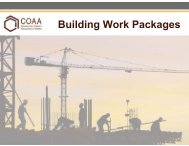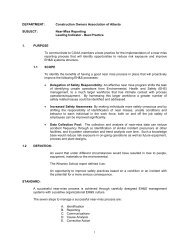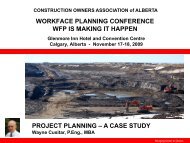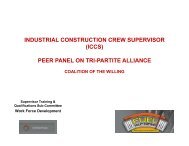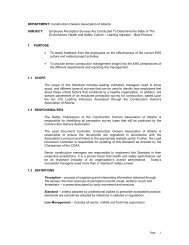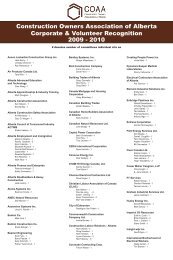Heavy Industrial Contracting - Construction Owners Association of ...
Heavy Industrial Contracting - Construction Owners Association of ...
Heavy Industrial Contracting - Construction Owners Association of ...
Create successful ePaper yourself
Turn your PDF publications into a flip-book with our unique Google optimized e-Paper software.
Contracts Workshop<br />
Best Practices Conference XIX<br />
Contract Promotions Workshop<br />
<strong>Heavy</strong> <strong>Industrial</strong> <strong>Contracting</strong>:<br />
Philosophies, Risk, and Application
Introductions<br />
Workshop Presenters:<br />
Contracts Workshop<br />
Dan Mowat, MBA-PM, PMP<br />
Project Business Manager, AMEC Oil Sands, Natural Resources<br />
W.J. (Bill) Kenny, Q.C.<br />
Partner, Miller Thomson LLP
Contracts Workshop<br />
Agenda<br />
1. History <strong>of</strong> the Contracts Committee<br />
2. Introduction to COAA Contract Forms<br />
3. Practical look at COAA Contract<br />
Terms<br />
4. Wrap-Up
COAA & Best Practices<br />
About COAA<br />
COAA is an association <strong>of</strong> Owner<br />
companies working together to achieve<br />
construction excellence in the heavy<br />
industrial sector in Alberta.<br />
COAA provides leadership in the drive<br />
towards safe, effective and productive<br />
project execution.
COAA & Best Practices<br />
About COAA<br />
Board comprised <strong>of</strong> senior representatives<br />
from Owner companies<br />
Best Practices Committee - creation and<br />
promotion <strong>of</strong> best practices for heavy<br />
industrial construction<br />
Executive Director and COAA Office Staff
COAA & Best Practices<br />
Best Practices Committees<br />
Best Practices Committees:<br />
• Safety<br />
• Workforce Development<br />
• Productivity<br />
• Contracts<br />
• promotion through workshops,<br />
seminars, COAA Best Practices<br />
Conference, and training programs
COAA & Best Practices<br />
Contracts Committee<br />
• a large, active committee <strong>of</strong> volunteers<br />
• representation from the industry<br />
stakeholders<br />
• Purpose: develop best practices<br />
focused on efficiency and high<br />
performance for heavy industrial<br />
projects in Alberta
COAA & Best Practices<br />
Contracts Committee<br />
• Goal: to provide tools to assist<br />
contracting parties that:<br />
• Provide clarity on obligations and<br />
risks<br />
• reduce costs associated with<br />
contract formation and<br />
administration
Model Contracts<br />
Overview <strong>of</strong> Contract Forms<br />
• Stipulated Price Contract (2003)<br />
• EPC Contract (2005)<br />
• EPCM Contract (2008)<br />
• Best Practices for the industry<br />
• Philosophy Documents<br />
• Available at www.coaa.ab.ca
Model Contracts<br />
Overview <strong>of</strong> Contract Forms<br />
• Free, and free <strong>of</strong> copyright<br />
• Goal is to provide flexibility<br />
• Use <strong>of</strong> COAA documents is encouraged<br />
• as a base document<br />
• may be modified on a project-specific<br />
basis
Model Contracts<br />
Overview <strong>of</strong> Contract Forms<br />
• make changes as supplementary<br />
conditions (e.g. Appendices & Forms)<br />
• take care when editing specific<br />
clauses to retain the intent <strong>of</strong><br />
referring or subsequent clauses<br />
• definitions are consistent (where<br />
possible)
Model Contracts<br />
Overview <strong>of</strong> Contract Forms<br />
• ‘blanks’ (e.g. insurance) need to<br />
reflect project requirements<br />
• take care when editing specific<br />
clauses to retain the intent <strong>of</strong><br />
referring or subsequent clauses
Model Contracts<br />
Overview <strong>of</strong> Contract Forms<br />
• philosophy documents provide<br />
background and context<br />
• review philosophy documents in<br />
conjunction with the application<br />
• guidelines and checklists are helpful<br />
for some <strong>of</strong> the Appendices
PRESENTER:<br />
W.J. KENNY
1. Three forms <strong>of</strong> Contract to be considered<br />
• Stipulated Price Contract<br />
• Engineering, Procurement and<br />
<strong>Construction</strong> Contract (EPC)<br />
• Engineering, Procurement and<br />
<strong>Construction</strong> Management Contract<br />
1
2. These are forms <strong>of</strong> Contract that are intended<br />
for industrial projects<br />
• There is no “Consultant” role<br />
• There is no “Payment Certifier”<br />
• The Owner is in control <strong>of</strong> the Project, and<br />
assumed to have the expertise and<br />
management capability to execute the Project<br />
• The Contractor is likewise assumed to have<br />
the skill and resources necessary to execute<br />
the work<br />
1
3. The Stipulated Price Contract includes:<br />
• Bid Conditions<br />
• General Conditions<br />
• Schedule “A” Scope <strong>of</strong> Work<br />
• Schedule “B” Payment for work<br />
• Schedule “C” Release and Certificate <strong>of</strong><br />
Final Payment<br />
• Schedule “F” Key Personnel,<br />
Confidentiality, Proprietary Information and<br />
Consent Agreement<br />
7
4. What you will not find in Contract:<br />
• The Contractor’s Proposal<br />
• Separate Articles <strong>of</strong> Agreement<br />
• Exhibits and Appendices<br />
• Supplementary General Conditions<br />
although these are contemplated<br />
8
5. Assumptions:<br />
• The work is an industrial project<br />
• The owner has completed the design<br />
• The owner will provide the site<br />
• The owner has arranged for timely<br />
delivery <strong>of</strong> owner supplied items<br />
9
• The Contractor is experienced in<br />
executing this type <strong>of</strong> industrial<br />
project and has the resources and<br />
supervisory personnel to do so<br />
• The Contractor is familiar with local<br />
conditions, including the local labour<br />
market, and can staff the Project<br />
with adequate skilled labour<br />
10
6. The Bid Conditions<br />
• Contemplates exceptions<br />
• Warrants that the Contractor has satisfied<br />
itself <strong>of</strong> all conditions affecting the work,<br />
particularly labour<br />
• invites alternatives<br />
• contemplates a clarification meeting<br />
• reserves the right to award to anyone, not<br />
necessarily the low bidder, but will review<br />
for commercial and technical merit<br />
11
7. The General Conditions<br />
GC 1-Definitions<br />
GC 1.1.37 Work<br />
Work means all labour, supervision,<br />
administration, materials, transportation,<br />
supplies, tools, equipment, temporary<br />
facilities, storage facilities, and such other<br />
work and materials, necessary to be<br />
performed or supplied for the work required<br />
by the Contract Documents including the<br />
12
GC 1.1.37 – con’t<br />
work described in Schedule "A" - Scope <strong>of</strong><br />
Work, and including any work which is not<br />
expressly described in the Contract but which<br />
is nevertheless necessary for the proper<br />
execution <strong>of</strong> the work required by the<br />
Contract Documents;<br />
13
GC 6-LABOUR<br />
6.1 The Contractor shall provide a sufficient<br />
number <strong>of</strong> qualified personnel to enable<br />
timely and proper execution and<br />
completion <strong>of</strong> the Work. All such personnel<br />
shall be competent, literate in English and<br />
qualified by education, training, experience<br />
and in all other respects capable <strong>of</strong><br />
carrying out the tasks to which each is<br />
assigned.<br />
14
GC 8 – Change mechanism<br />
• Owner issues contemplated Change Notice to<br />
Contractor<br />
• Contractor provides Change Quotation<br />
• Owner accepts and issues Change Order, or<br />
issues Change Directive<br />
• Contractor may request change through a<br />
Change Quotation<br />
• Dispute on entitlement resolved under dispute<br />
resolution mechanism<br />
15
GC 8 – Change mechanism – con’t<br />
• all changes to the Contract must be made<br />
by change Order or Directive<br />
• all impact costs or costs <strong>of</strong> acceleration are to<br />
be included in the Change Quotation<br />
• materially different subsurface or actual<br />
physical conditions merit a Change Order<br />
16
GC 9 – Completion & Acceptance<br />
• Owner may take partial completed work<br />
• Functional Completion can be for the<br />
entire Work or a Component system<br />
• Final Completion notice after all Work<br />
completed and all known deficiencies<br />
corrected.<br />
17
GC 18-Force Majeure<br />
• Event <strong>of</strong> Force Majeure defined 1.1.14<br />
• Event <strong>of</strong> Force Majeure means any<br />
occurrence, other than the financial<br />
capability <strong>of</strong> a party or an event constituting<br />
a delay under GC 19, which is beyond the<br />
control and without the fault or negligence <strong>of</strong><br />
the party relying on such occurrence, and<br />
which by the exercise <strong>of</strong><br />
18
easonable diligence that party could not at<br />
the time <strong>of</strong> bidding have reasonably<br />
contemplated happening and is unable to<br />
prevent or provide against;<br />
• If Owner does not agree, revert to<br />
change mechanism<br />
• time extension is the remedy for Event <strong>of</strong><br />
Force Majeure<br />
19
GC 20 – Suspension Allowed to Owner<br />
• payment <strong>of</strong> direct costs<br />
• no payment for damages or loss <strong>of</strong><br />
pr<strong>of</strong>it<br />
20
GC 21 – Termination<br />
• for convenience available to Owner,<br />
for all or a portion<br />
21
GC 25 – Warranties<br />
• from Functional Completion<br />
• that the Work meets the requirement<br />
<strong>of</strong> the Contract Documents<br />
• come back warranty for specified<br />
time<br />
• applies to re-performed work<br />
22
GC 26 – Indemnities<br />
GC 26.4 Limitation on consequential damages<br />
26.4 Notwithstanding anything else in this<br />
Contract, the Contractor, its Subcontractors,<br />
Suppliers, and their respective <strong>of</strong>ficers,<br />
directors, employees, consultants and agents<br />
shall not be liable to the Owner, or anyone<br />
claiming through or under it, whether by way<br />
<strong>of</strong> indemnity or by reason <strong>of</strong> breach<br />
23
<strong>of</strong> contract or in tort, including liability for<br />
negligence and breach <strong>of</strong> statutory duty, or on<br />
any other legal or equitable basis, for:<br />
26.4.1 special or consequential loss or<br />
damage;<br />
26.4.2 loss <strong>of</strong> use, whether complete or<br />
partial, <strong>of</strong> the Work or existing facilities<br />
<strong>of</strong> the Owner or third parties;<br />
26.4.3 loss <strong>of</strong> product;<br />
24
26.4.4 loss <strong>of</strong> revenue, overhead and pr<strong>of</strong>it; or<br />
26.4.5 loss <strong>of</strong> any contract that may be<br />
suffered by the Owner,<br />
except to the extent <strong>of</strong> amounts recoverable<br />
under a policy or policies <strong>of</strong> insurance<br />
required to be maintained by the Contractor,<br />
or provided by the Owner, pursuant to the<br />
provisions <strong>of</strong> this Contract, provided<br />
25
however that in the event <strong>of</strong> the failure by the<br />
Contractor to complete the Work by the<br />
Contract Time the liability <strong>of</strong> the Contractor<br />
under this GC 26.4 shall be limited only to the<br />
greater <strong>of</strong> the insurance recoverable and<br />
$______________.<br />
26
Schedule A – Scope <strong>of</strong> Work<br />
• Describe Scope <strong>of</strong> Work<br />
• Contractor’s General<br />
Responsibilities<br />
• Hours <strong>of</strong> Work<br />
• Milestone Dates<br />
• Work Schedule<br />
27
Schedule A – Scope <strong>of</strong> Work – con’t<br />
• Drawings, Code and Standards<br />
• Connecting Work<br />
• QC Program<br />
• Safety and Loss Management<br />
• Document Submission Requirements<br />
Progress Reporting and Other Reporting<br />
• Meetings and Reports<br />
28
Schedule C – Release and Certificate <strong>of</strong><br />
Final Payment<br />
• payment <strong>of</strong> Subcontractors and<br />
Suppliers<br />
• release <strong>of</strong> all claims in respect <strong>of</strong><br />
which notice in writing has not been<br />
given<br />
29
Schedule E – Statutory Declaration<br />
• payment <strong>of</strong> all Subcontractors and<br />
Suppliers<br />
• complied with all <strong>of</strong> its lawful<br />
obligations<br />
30
Schedule F – Key Personnel<br />
confidentiality undertaking<br />
31
ENGINEERING, PROCUREMENT AND<br />
CONSTRUCTION CONTRACT (EPC)<br />
32
1. To the extent possible, definitions and<br />
terms are the same as the Stipulated<br />
Price Contract.<br />
2. In this Contract, there are 49 Articles<br />
and 9 Appendices, as follows:<br />
33
• Appendix A – Owner’s Requirements<br />
• Appendix B – Compensation<br />
• Appendix C – Policy and Guidelines<br />
• Appendix D – Warranty Items Procedure<br />
• Appendix E – Liquidated Damages<br />
• Appendix F – Incentive Fee<br />
• Appendix G – Forms<br />
• Appendix H – Dispute Resolution Procedure<br />
• Appendix I – Key Personnel [NTD: Use if not in<br />
Execution Plan]<br />
34
3. Definitions:<br />
<strong>Construction</strong> Work<br />
1.1(s) Engineering Services means<br />
those services described in the Owner’s<br />
Requirements and provided by the<br />
Contractor for the design, planning and<br />
engineering <strong>of</strong> the Project, but does not<br />
include <strong>Construction</strong> Work or<br />
Procurement Services;<br />
35
1.1(rr) Procurement Services means the<br />
procurement <strong>of</strong> Procured Goods<br />
performed by the Contractor, which may<br />
be performed as agent <strong>of</strong> the Owner, or<br />
for the Contractor on its own account,<br />
as stipulated in the Owner’s<br />
Requirements;<br />
36
1.1(kk) Owner’s Requirements means<br />
the description <strong>of</strong> the scope, standards,<br />
design criteria, Performance<br />
Guarantees, Milestones and the<br />
programme <strong>of</strong> work set out in Appendix<br />
A – Owner’s Requirements, as<br />
amended by any Changes;<br />
37
• 1.1(u) Execution Plan means the<br />
programme developed by the<br />
Contractor for the Work in accordance<br />
with Section 4.2 and which shall be<br />
updated from time to time as may be<br />
required by the Owner and which shall<br />
include, but not be limited to:<br />
38
1.1(u) – cont’d<br />
– the organisation to be established by the<br />
Contractor for carrying out the Work, including, but<br />
not limited to, the identities and curriculum vitae <strong>of</strong><br />
Key Personnel, or if not yet identified, then the<br />
titles <strong>of</strong> the positions that will be held by Key<br />
Personnel;<br />
– the sequences and methods for the performance<br />
<strong>of</strong> the Work; and<br />
– a detailed schedule with dates for the completion<br />
<strong>of</strong> Milestones;<br />
39
1.1(x) Functional Completion means<br />
that date when the Work, or a System:<br />
– has passed the required Performance Tests that<br />
are stipulated in the Owner’s Requirements to be<br />
performed before Functional Completion; and<br />
– is certified by the Owner’s Representative pursuant<br />
to Section 19.4 as being complete or ready to be<br />
put into service, or being used for the purpose<br />
intended and a Functional Completion Certificate is<br />
issued;<br />
40
8. Article 8 – <strong>Construction</strong> Work<br />
8.2 Except for those materials, services<br />
and equipment to be provided by the<br />
Owner and described in Appendix A –<br />
Owner’s Requirements, the Contractor<br />
shall supply or cause to be supplied all<br />
services, equipment and materials<br />
required for the proper execution and<br />
completion <strong>of</strong> the <strong>Construction</strong> Work.<br />
41
9. Article 9 – Commissioning<br />
9.1 The duties <strong>of</strong> the Owner and <strong>of</strong> the<br />
Contractor in relation to Commissioning<br />
before Functional Completion and<br />
Commissioning after Functional<br />
Completion, together with the<br />
Milestones to be reached for<br />
commissioning, are as set out in the<br />
Owner’s Requirements.<br />
42
17.Warranty – begins on Functional<br />
Completion<br />
18.Article 30 – Proprietary Information<br />
- technology developed by Contractor is<br />
Contractor’s unless resulting from<br />
Owner’s Confidential Information<br />
43
• 42.3 Notwithstanding any other provision <strong>of</strong> the<br />
Contract, the Contractor’s total aggregate liability to<br />
the Owner shall be limited to $_____________.<br />
• [NTD: Section 42.3 is to be used only where the<br />
parties choose not to include Liquidated Damages<br />
in the Contract. In addition, if Section 42.3 is to be<br />
incorporated, the Committee suggests that the<br />
parties negotiate whether the following<br />
indemnities obligations <strong>of</strong> the Contractor should<br />
44
e carved-out <strong>of</strong> the cap: Section 28.1<br />
(intellectual property infringement); Section<br />
39.1 (liens); Section 41.1 (third party claims);<br />
Section 45.3 (independent contract indemnity);<br />
obligations relating to workers’ compensation<br />
premiums if the Owner is held accountable;<br />
and any taxes payable by the Contractor for<br />
which the Owner is held accountable.]<br />
45
COAA EPCM CONTRACT<br />
46
Where possible, definitions used in the COAA<br />
Stipulated Price Contract and EPC Contract<br />
have been incorporated in this EPCM<br />
Contract in an effort to use consistent terms.<br />
To accommodate a variety <strong>of</strong> projects,<br />
project-specific information is contained in the<br />
Appendices to the EPCM Contract.<br />
47
The EPCM Contract is intended to serve as a<br />
starting point for negotiations and can be modified<br />
by the parties with respect to a specific project. It is<br />
preferred that changes be made to the EPCM<br />
Contract by way <strong>of</strong> supplementary conditions so that<br />
the COAA form remains as a precedent. However,<br />
care must be taken in the modification or editing <strong>of</strong><br />
specific clauses without consideration <strong>of</strong> changing<br />
the intent <strong>of</strong> referring or subsequent clauses.<br />
48
Risk in Allocation in EPCM <strong>Contracting</strong><br />
EPCM contracts require the EPCM Contractor to<br />
provide pre-construction to post-construction<br />
services. The services start at the front end with<br />
engineering, move to procurement and follow<br />
through with construction management, which<br />
will last to project closeout and sometimes<br />
through the construction warranty period.<br />
49
The Committee recognized that, in some<br />
cases, the EPCM Contractor will provide<br />
fabrication as part <strong>of</strong> its scope. The actual<br />
construction work is provided by parties<br />
referred to as "Works Contractors". The<br />
EPCM Contractor would not provide directhire<br />
construction forces without the Owner's<br />
consent.<br />
50
The EPCM model allows the Owner to be more<br />
involved in the design process and this relationship<br />
needs to be addressed between the Owner and the<br />
EPCM Contractor prior to project commencement.<br />
The Owner needs to be realistic as to what<br />
involvement to have and what resources are<br />
available to provide effective and timely input to the<br />
design process. The Owner's expectations and<br />
resources should be reflected in Appendix A -<br />
Owner's Requirements.<br />
51
An EPCM Contractor is agent for the<br />
Owner both in relation to procurement and<br />
<strong>Construction</strong> Management<br />
52
Works Contracts<br />
As the EPCM Contractor will be the agent <strong>of</strong> the<br />
Owner, works contracts for the performance <strong>of</strong><br />
the construction are entered into between the<br />
EPCM Contractor, as agent for the Owner, and<br />
the Works Contractor. Works Contractors may<br />
be recommended by the EPCM Contractor to<br />
the Owner, or may be selected by the Owner.<br />
53
The works contracts can be let on any<br />
basis that the contracting plan determines<br />
is appropriate for the project (for example:<br />
stipulated price, unit price, cost<br />
reimbursable, guaranteed maximum<br />
price).<br />
54
Wrap-up<br />
Contracts Seminars - Planning to run ½ day<br />
sessions again in Fall 2011 – what topics interest you?<br />
Workshop Evaluation Form<br />
Contracts Workshop<br />
Interested in joining the Contracts Committee?<br />
Co-Chairs:<br />
Jane Sidnell, Fraser Milner Casgrain LLP (403) 268-3119<br />
Dan Mowat, AMEC Americas, Limited (403) 298-8054






